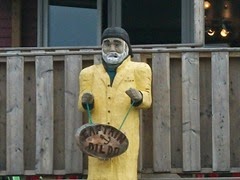CBC’s online version got the story right from the most recent episode of On Point with David Cochrane:
Natural Resources Minister Jerome Kennedy says the Newfoundland and Labrador government is not back-pedaling in how it is handling the Muskrat Falls hydroelectric project, even though the governing Tories are already planning measures they had ruled out.
And Kennedy is being absolutely straight with people: the provincial government is not changing its direction.
Most emphatically and absolutely no change. It’s Muskrat Falls or bust.
The ruling Conservatives are just changing the tone.
They are changing the appearance of things as they try and recover from the very serious blow delivered recently by the public utilities board
Look at what Jerome told David Cochrane. two phrases in particular leap out:
“You have to show as a politician that you are flexible and open to listening to what the people are saying … what we are trying to do is assure the people of the province that everything is being considered…”
Show.
Not be. Not do.
Show.
Open to listening.
Not actually listening. Or listening and then changing.
Just listening.
And that’s what this latest development is really all about: the appearance of change without actually changing.
Odds are very good that the government’s polling – done by Nalcor’s advertising agency – is showing that the government’s intransigence is undermining their credibility even further. Their strategy isn’t working. People aren’t willing to just put blind faith in Jerome and Kathy and Fairity O’Brien.
That polling would very likely lead to advice for Nalcor and the government to change how things look. Image, after all, is everything for some people.
You wouldn’t need to poll, though, to hear people wonder aloud why the government is proceeding with this project at break-neck speed and despite the thoughtful criticism from a bunch of very smart people with tons of credibility.
You could also tell earlier on that the critics’ comments about Muskrat Falls did serious damage to the government case for Muskrat Falls. Jerome Kennedy attacking them personally.
So now there will be a debate in the legislature. As Jerome noted for On Point, the government has to introduce a piece of Muskrat Falls legislation this session anyway so they will now just have a bigger form of that debate.
Hang on a second.
What piece of Muskrat Falls legislation? They’ve never mentioned that before. Maybe we’ll find out what the legislation is about but notice that for all the promises Jerome made about assuring everyone that the government will put information in front of people, he hadn’t mentioned that important piece of information before.
The problem is not image. It’s credibility. They say one thing and do something else.
This new piece of legislation for Muskrat Falls will come before project sanction. Logically, friends, that pretty much wipes away any suggestion in Kennedy’s comments later on with David Cochrane that Muskrat Falls might not happen.
Not surprising that Jerome didn’t mention it before now. Makes it kinda hard to assure people you could walk away from Muskrat Falls without batting an eyelid if you are planning to change the laws to pave the way for it before you’ve supposedly decided to get on with it.
So anyway, once again Jerome Kennedy wants to reassure people in the province that they will have all the information the public utilities board couldn’t get plus reports on wind and natural gas in order to assure the people of the province that Nalcor has considered all options before picking Muskrat Falls.
He mentions reports on wind and natural gas that some companies will complete for Nalcor.
Just remember what Nalcor and the provincial government have always said. You can find it in a blog post by Nalcor boss Ed Martin over at Nalcor’s “leadership” blog, posted April 5:
Nalcor examined a broad selection of generation supply options to meet the island’s growing and long-term electricity needs including: nuclear, natural gas, liquefied natural gas, coal, continued oil-fired generation at Holyrood, simple and combined cycle combustion turbines, wind, biomass, solar, wave and tidal, hydroelectric developments on the island and Labrador and electricity imports.
They looked at it all before picking MF. You name it: they studied it.
Supposedly.
So what’s with the new studies?
Good question.
If the MFers had really had looked in detail at everything before picking Muskrat Falls, then they would - Number One – already have those studies and would not need to produce “reports”, and - Number Two – they’d have already released them to show that the alternatives just don’t work.
Yes friends, you are already getting the distinct aroma in your nostrils of the spore from rattus politicus pinocchiosa. That is one honking big rat turd you smell, too.
You see, we know what these reports will say. We know because Jerome told us.
March 6 in the House of Assembly:
MR. KENNEDY: … We have looked at natural gas, Mr. Speaker, extensively. In fact, I can say to the Leader of the Opposition, I met with Ziff Energy out of Calgary on the weekend while in Toronto on another matter. They concluded, clearly, that the importation of gas from the United States is not economically feasible. Mr. Speaker, we know, clearly, that the building of a pipeline from the Grand Banks is not feasible. If the Leader of the Opposition has other options, I would like to know what they are.
March 7:
MR. KENNEDY: … I have met with different consultants in this area, most notably Wood MacKenzie out of New York and PIRA out of New York. We have discussed the issue of the pricing of natural gas and the effect of shale gas on markets and electricity markets.
This past weekend, Mr. Speaker, I met with a company called Ziff Energy out of Calgary. I met with them in Toronto. We outlined to them the proposals that had been put forward by various critics of the project and the conclusion reached, Mr. Speaker, by all of these consultants, experts, not self-professed experts, Mr. Speaker, the conclusion reached is the importation of natural gas is not economically feasible, nor is the building of a pipeline from the Grand Banks.
Remember Jerome’s penchant for slagging the critics” “Not self-professed experts”. You can tell that all those critics, none of whom are self-professed anything, are causing Jerome and his mates lots of trouble.
And if that doesn’t jog your memory, here’s Jerome from March 13:
MR. KENNEDY: Thank you, Mr. Speaker.
Mr. Speaker, Mr. Ed Martin, the President of Nalcor, outlined in great detail the steps that they had taken in terms of looking at the options for Muskrat Falls, Holyrood refurbished. They indicated that at the Decision Gate 2 process, liquefied natural gas was screened out. Mr. Speaker, as Mr. Martin indicated, it was a fairly easy decision at that point because the viability of building a 350 to 650 kilometre pipeline from the Grand Banks just did not work. I am not aware of any LNG study.
Mr. Speaker, I have indicated on several occasions, I have met with experts, notably Wood MacKenzie in New York, PIRA in New York, and Ziff Energy of Calgary and discussed natural gas. I have indicated that the opinions given to us unanimously are that natural gas is not going to work. There are no studies or reports that I am aware of. If there are, they are in the eight boxes and I suggest that the Opposition go through them.
To paraphrase Jerome’s line until now: We looked at it all. We’ve talked to the experts. They tell us we were right the first time.
Nothing changed at all in his discussion with David Cochrane over the weekend, except the cosmetic shift in tone we’ve already noted. Any claims or suggestions to the contrary are simply unfounded. you won’t need an expert study to see why. To borrow a phrase the lawyers like: the thing speaks for themselves. Res ipso loquitur.
And even with a make-over, Muskrat Falls is still in trouble and the strategy the government is following is still Arnold Ziffel with a new smear of lipstick. They are ploughing ahead with Muskrat Falls and all the sound advice in the world won’t persuade them to change their course.
We know that because finance minister Tom Marshall said it on province-wide radio this week, before Jerome tried to change the tone of government’s MF message track:
The opposition will get its say, then the government will get its way. That’s how democracy works.
That isn’t how democracy ought to work. It is, however, how Jerome and his friends know it does work around these parts. They just get shy when people realise it.
- srbp -


